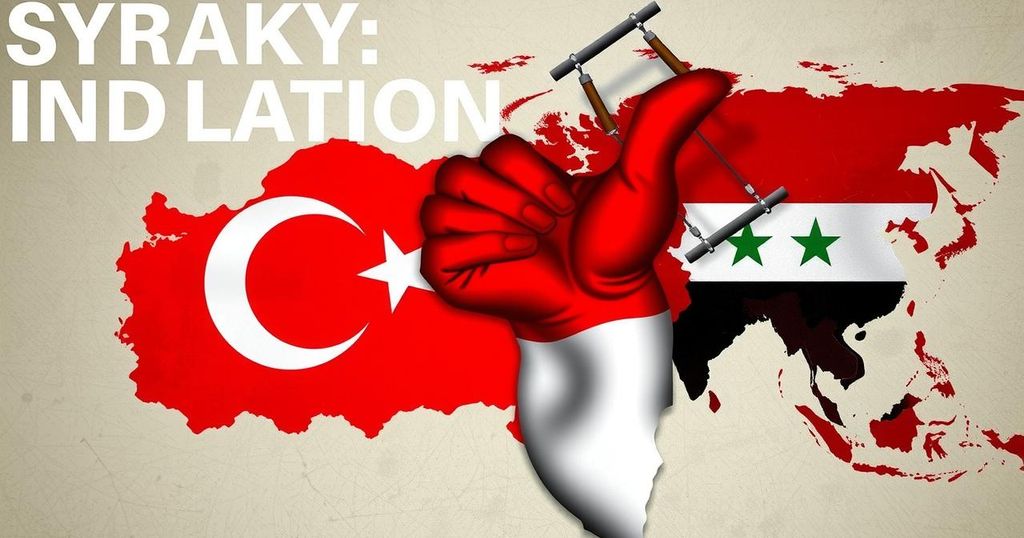World news
ASIA, ASSAD, BASHAR AL - ASSAD, DID, ERDOGAN, EUROPE, EUROPE/ASIA, EUROPEAN UNION, FIGHTER JETS, FOREIGN POLICY, FRANCE, KURDISTAN WORKERS ' PARTY, MANBIJ, MILITARY ACTIONS, NORTH AMERICA, PKK, REC, SYRIA, SYRIAN CIVIL WAR, SYRIAN CONFLICT, SYRIAN DEMOCRATIC FORCES, TURKEY, UNITED STATES, WAR
Lena Nguyen
0 Comments
Turkey’s Strategic Gains Following the Ouster of Bashar al-Assad in Syria
The ousting of Bashar al-Assad in Syria represents a notable shift that enhances Turkey’s regional influence, while simultaneously presenting strategic challenges for President Erdogan. Ankara’s military support for rebels and engagement with Kurdish forces reflect Turkey’s assertive objectives. The situation of Syrian refugees in Turkey and future relations with Russia are additional critical factors influencing the region’s stability following Assad’s removal.
The recent ousting of Bashar al-Assad in Syria marks a significant shift in the Middle East, particularly for Turkey, which emerges as a key player amid this upheaval. Turkish President Recep Tayyip Erdogan had previously attempted to negotiate with Assad, expressing a willingness to collaborate on Syria’s future. However, Assad’s refusal to engage has led to his substantial downfall as rebel forces, particularly from the Islamist group Hayat Tahrir al-Sham (HTS), rapidly advanced towards Damascus. With a shared border of over 900 kilometers, Turkey is poised to exert greater influence in Syria’s future, especially in countering threats from Kurdish groups that Erdogan links to terrorism.
As Erdogan strengthens Turkey’s position, the country’s military presence in Idlib province has been enhanced, with around 15,000 troops stationed there since 2017. Turkey’s alliance with HTS, despite divergent ideologies, facilitated the swift maneuvers of the Turkish-supported Syrian National Army (SNA) alongside HTS combatants, suggesting Ankara had foreseen these developments. In the wake of Assad’s fall, Turkish-backed rebels successfully seized control of the northern town of Manbij from Kurdish-led forces. This operational shift aligns with Erdogan’s long-term strategy to establish a security buffer along the Syrian-Turkish border, vital for countering perceived threats from groups like the Kurdish People’s Protection Units (YPG).
The status of Syrian refugees in Turkey also remains contentious. With over three million currently residing in Turkey, the refugee issue has significant domestic political implications for Erdogan, especially following the recent elections. Although some Syrians express a desire to return home, many remain cautious amid prevailing instability. The future of these refugees will depend significantly on the changing political landscape in Syria, and returning them en masse presents considerable logistical challenges.
Looking ahead, the potential for Turkish and Russian relations remains complex. Turkey has sought to mend ties with Assad, aided by Russian support, yet Assad’s previous disregard for Russian counsel complicates these dynamics. The fate of crucial Russian military bases in Syria, particularly the Tartus base, looms as a critical factor in both sides’ strategic calculations. Overall, while Turkey has emerged as a significant regional winner in the immediate aftermath of Assad’s ousting, the broader implications hinge upon the new Syrian government’s stance towards Kurdish groups and Turkey’s ambitions in the region.
The landscape of the Middle East has shifted dramatically following the recent removal of Bashar al-Assad from power in Syria. This event not only alters Syria’s internal dynamics but also enhances Turkey’s stature within the region, particularly concerning its interests in countering Kurdish forces it associates with terrorism. President Recep Tayyip Erdogan’s approach emphasizes both military strategy and the handling of Syrian refugees in Turkey, which poses several challenges ahead as the political situation in Syria evolves. Furthermore, Turkey’s interactions with both Syrian and Russian authorities will be crucial in determining future stability within the region.
In summary, the fall of Bashar al-Assad presents Turkey with both opportunities and challenges as it asserts greater regional influence. President Erdogan’s strategies involve military maneuvers against Kurdish forces and managing the complex situation of Syrian refugees currently in Turkey. The evolving political dynamics in Syria, especially concerning the new governance and relationships with key players like Russia, will be decisive in shaping the future of Turkey’s influence and stability in the region.
Original Source: www.france24.com




Post Comment